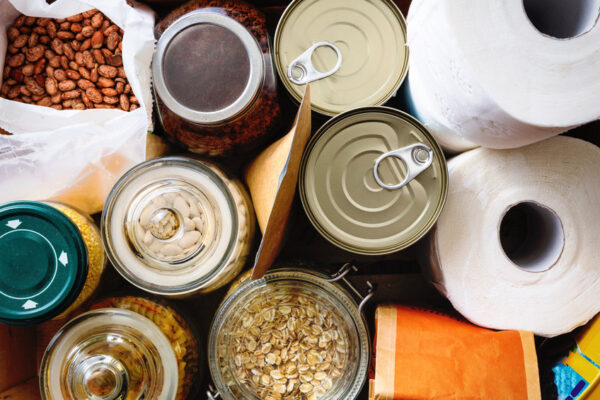Learn various tips and what to store long-term as you build your food supply, including medicinal items and emergency essentials to productively round out your pantry. Preparedness isn’t just for preppers – it’s for everyone!
Why Stock Your Pantry Now?
A disaster is relative to you. It is what hits you personally and financially. A disaster could be the loss of income, a death in the family, an accident or personal injury. Other disasters may of a larger scale like a massive power outage, hurricane and tornado, food shortages and supply chain disruption. But whatever the disaster, they all have something in common. The disaster puts us in a position where the necessities in life (food, water and shelter) are catapulted to the forefront of survival. How are you going to eat and drink, provide yourself shelter and how are you going to stretch every penny without having to rely on our food supply system?
To have peace of mind when life throws us an unforeseeable curveball, take steps now to store emergency food, water and supplies. The action word here is, now! Do not wait for things to get hairy only to then scramble to procure food and supplies as shelves become bare again. Create a plan in-line with your current budget and start enthusiastically setting aside time, money and resources to ensure you have a well-rounded confidently stocked pantry of items to see you through.
READ MORE: Understanding Botulism when home canning

How to Decide What to Store?
The goal is to store foods you eat regularly and require no refrigeration, and with limited to no preparation or cooking. You will often hear me say, “If you won’t eat it, don’t can it”. This holds true when deciding what to grow, buy or preserve to later store in your pantry. To start this process, you must create a list. Without a well thought out list, your pantry will just harbor “foodstuff” because there is no plan in mind. Even more so, a list prevents you from making reckless purchases and poor choices that waste time, money and precious pantry space.
There are many reasons to ensure you have a well-stocked pantry, and each of us have different reasons why we stock certain foods and dry goods. Some of us tend to stock up when things go on sale at the store, while others want to ensure they have enough toilet paper after what we experienced in 2020.
Five Questions to Ask Yourself When Stocking Your Pantry
So you may be productive in your preparedness, here are five questions I want you to ask yourself when you are 1) planning your garden, 2) creating your canning and dehydrating calendar and 3) when headed to the store to go shopping:
1. Will we eat it?
Picture it. Pickled Herring goes on sale at your local grocer. You get excited as you remember eating grandma’s pickled herring as a kid. You recall it tasting quite good on soda crackers so you decide to purchase four cases yielding 48 four-ounce servings.
Upon getting home, you get your spouse and kids all psyched to try this favorite childhood snack. They enthusiastically abide and hold out a soda cracker awaiting their treat. As you open the tin container, your youngest gets a whiff of its pungent aroma and dry heaves while your spouse almost passes out at the sight of ‘fish skin’. Their refusal to even try pickled herring leaves you with several cases that will likely remain unopened until kingdom come…all because “you got a good deal”.
Select foods you and your family regularly consume and from food groups you would often serve on any given day. Even if everyone in your household LOVES pickled herring, it is not something you would consume for breakfast, lunch and dinner normally, so why would you when times are tough when disaster strikes?
2. Are my choices healthy?
During a disaster, we may not have access to all the privileges we are used to, so it is very important we ensure our food supply choices are healthy ones. Especially if the disaster is significant and we will not have easy access to medical treatment for a duration.
When shopping, growing and preserving, make sure to include vitamins, band aides and antibacterial ointment. Be sure to grow medicinal herbs in your garden or deck pots. Even something as simple as growing fresh peppermint to later dehydrated into tea leaves. Peppermint tea is proven to aide with digestive issues.
When canning, be sure to round out your food supply by balancing your jams and pie filling, essentially your sweet treats, with a larger supply of vegetables and protein-packed recipes. We cannot sustain on jam, but we certainly may ride out a disaster with Chicken Pot Pie Filling and Beef Stew.
3. Does my food supply incorporate the main five food groups?
When presenting and teaching, I will often say to my audience, “Having pressure-canned dried pinto beans in your pantry is a very economical way to ensure you have a hearty supply of protein”. However, you cannot live on an all-bean diet and expect to retain good health.
Make sure your pantry includes home canned foods and dried goods such as:
- Soups
- Fruits
- Fermented and Pickled items
- Vegetables in water
- Meat varieties and Meat in a Jar
- Beans and Legumes
- Cooking oil
- Salt
- Vinegar
- Grains
- Dried Beans
- Evaporated and Powdered Milk
- Coffee
- Potable (Drinkable) WATER
4. Did I provide food for comfort?
While working in Haiti for 12 weeks after the 2010 Earthquake destroyed Port au Prince, I quickly learned how important both physical and mental health was to survival. Both are truly crucial to surviving and thriving during and after a major disaster. Be sure your pantry includes comfort foods, meaning you and your family’s favorite meals, as well as sweet treats for occasional mood and energy boosts.
Personally, I always keep a couple jars of chipped beef in my pantry because Chipped Beef on Toast is a meal reminiscent of my childhood and is a dish which brings an instant smile to my face. If I can transport back to a happy time for even just a few minutes during a disaster, it is the fuel I need to keep pushing forward. Hard candy is another product to add to the list. It is easy to store, gives a quick boost of sugar for energy, and often heightens the mood as you enjoy your favorite flavor.
5. What if someone gets sick?
There are so many obvious reasons to stay healthy, however it is more imperative to remain healthy during times of disaster. Power outages, water contamination and limited access to medical care are commonplace during hurricanes, tornadoes and winter ice storms. Ensuring you have foods known to boost your immune system like, home canned chicken soup, asparagus soup, and beef bone stock can be the difference between illness and health and/or a quick recovery.
I also highly recommend you also consider water bathing elderberry jam, storing raw honey, create fruit and herb elixirs, home can my Ginger Tea recipe and consider preserving sauerkraut, which is loaded with probiotics. Lastly, stock up on electrolyte drinks such as Pedialyte® and be sure to have extra packages of green tea bags or loose-leaf green tea, stored in airtight containers.

READ MORE: Which type of pressure canner should I buy?
Having a ready-made food supply is critical in times of disaster, and in extreme cases, it is the difference between life and death. Ready-made food means it requires no water, heat or refrigeration and can be eaten immediately without any preparation.
Answering these five questions will help you gain confidence when shopping and preserving and give you peace of mind knowing you have a well-rounded, fully stocked pantry no matter what life throws at you.
Be sure to tune in to Canning with The Diva!™ podcast and learn a variety of canning recipes, preserving techniques, economical solutions to be prepared and so much more. Available wherever podcasts are played.
Happy Canning!
xo
Diane, The Canning Diva®
www.canningdiva.com
